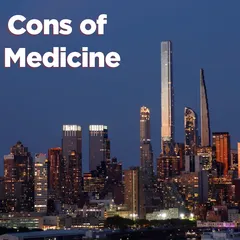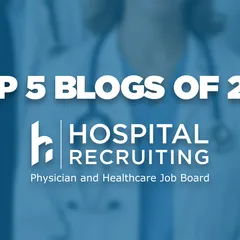Healthcare Career Resources Blog
A Few Reasons to Be Excited About Healthcare in 2020
By Mitchel Schwindt, MD - February 17, 2020
The pace of innovation in healthcare would bring a quizzical smile to the forefathers of medicine. By living in the future, brilliant minds are radically altering all aspects of the medical arena in today's world.
Resident/Medical Student Burnout and How to Fight It
By James L West, MD - February 12, 2020
Articles describing physician burnout have dominated the medical reporting landscape recently. The problem is widespread, as many as 44% of physicians met the criteria for burnout in recent studies. The consequences are severe – physicians complete suicide at twice the rate of the general population. While this epidemic is being recognized in attending physicians, the roots of the epidemic have not been fully addressed. Often, by the time that physicians have been worn down to contemplating or attempting suicide, they have been dealing with burnout and depression for much longer. The roots of this current epidemic, and the key to effectively preventing it, lie in the medical training pipeline.
Rural Recruitment: How to Identify and Mentor Rural Superstars
By Stacey E. Halford, MSW, LMSW - February 10, 2020
Learn more about the qualities to look for as you recruit and mentor Rural Superstars for your practice or hospital.
A Little Job Search Advice for the New Grad Nurse
By Kyndall Brown, RN - February 7, 2020
You’ve aced all your classes, walked across the stage, and passed the NCLEX. What a relief! Now you can relax. For about a minute. Because now comes the real work – getting out there and finding a job...
How To Evaluate a Potential Career Change in Medicine
By Mitchel Schwindt, MD - February 5, 2020
Change is hard, but when done for the right reasons, it can be positively transformative.
Employee Referrals - An Overlooked Hiring Resource
By Riia O'Donnell - February 3, 2020
In a tight talent market, healthcare providers are looking for every possible avenue to source candidates, but they often overlook an excellent source right in their midst – employee referrals. Your best employees likely have a network of like-minded, similarly situated friends and associates among their peers. Tapping into these networks could create an invaluable candidate pipeline for today and the future.
When Nursing Feels Like Too Much
By Tammy McKinney, RN - January 31, 2020
Nursing is a challenging field and will likely remain so for many years to come. If you’re planning on staying in the field long-term, it’s imperative that you perform self-care on a regular basis. Read this article for tips on recognizing and preventing work-related stress, burnout, anxiety, and depression.
Get Paid For The Work You Do: Why RVUs Are A Great Way To Go
By Russell Singleton, PA - January 29, 2020
While there are many ways to add value to a practice, healthcare provider value, and thus their compensation, is often tied to billing and collections. How is this relationship determined? Put simply, some receive a percentage of revenues and some are paid by RVUs, but which system makes the most sense? This article will discuss two main ways that clinician production is compensated.
Top 3 Healthcare Staffing Trends of 2020
By Jennifer Alexander, SHRM-CP - January 27, 2020
Like 2019, 2020 will push employers to maximize their resources while focusing internally on how they want to sell themselves to potential hires. With an ever-shrinking candidate pool and continued shortage of healthcare professionals, it will be more important than ever for organizations to become both unique and efficient in their staffing strategies. Social media, candidate sourcing, and the candidate experience will shape the success of the healthcare industry.
How Resident Physicians Can Incorporate Wellness Into Their Everyday Work Routine
By Audrey Rutherford, MD - January 24, 2020
Read this article for some practical (anecdotally trialed) tips for incorporating wellness into everyday work for a new resident.













